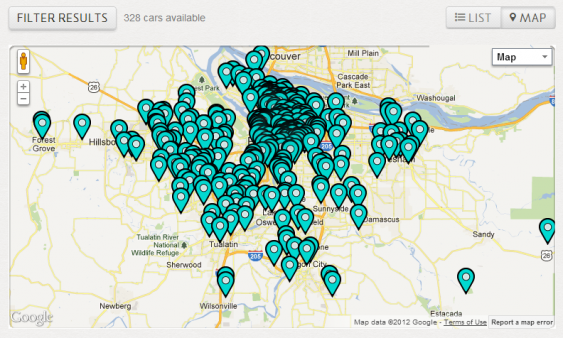What a difference a few months make!
At the end of July, we gave Vancouver, BC the gold medal in our “Northwest Car Sharing Olympics.” Vancouver edged out Portland in our rankings, largely because Vancouver had three mature car sharing services with a variety of pricing and membership models. Portland also had three services; but its peer-to-peer car sharing service, Getaround, was just getting off the ground, with only about 70 cars available for short-term rental at the time we looked.
Fast forward just two and a half months, and Getaround’s car availability has nearly quintupled. The service currently offers 328 cars in greater Portland, including both the city and the suburbs. And no matter where you are in the urban core, it seems like there’s a peer-shared car within a few blocks’ walk.
To me, this shows the tremendous power of peer-to-peer car sharing. Most cars spend most of their time parked, so there’s a HUGE potential for rapid ramp-up: even if only a small share of car owners are willing to rent out their rides, that still means a massive untapped market for car sharing. And short term rentals are the sort of voluntary transaction in which everyone wins: car owners earn a bit of cash, while people who don’t want, or can’t afford, a car of their own can get a convenient, temporary set of wheels. Cool!
So I think it’s probably time to reconsider our car sharing rankings for Northwest cities: now that Portland’s Getaround service has reached critical mass, I think that it’s time to move the Rose City into the gold medal slot for Northwest car sharing.
(Full disclosure: Sightline board member John Atcheson used to be an employee of Getaround.)



Comments are closed.